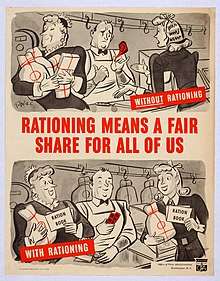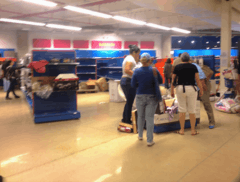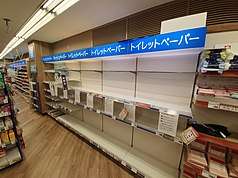Panic buying
Panic buying (alternatively hyphenated as panic-buying; also known as panic purchasing) occurs when consumers buy unusually large amounts of a product in anticipation of, or after, a disaster or perceived disaster, or in anticipation of a large price increase or shortage.
Panic buying during health crises is influenced by "(1) individuals' perception of the threat of a health crisis and scarcity of products; (2) fear of the unknown, which is caused by emotional pressure and uncertainty; (3) coping behaviour, which views panic buying as a venue to relieve anxiety and regain control over the crisis; and (4) social psychological factors, which account for the influence of the social network of an individual."[1]
Panic buying is a type of herd behavior.[2] It is of interest in consumer behavior theory, the broad field of economic study dealing with explanations for "collective action such as fads and fashions, stock market movements, runs on nondurable goods, buying sprees, hoarding, and banking panics."[3]
Panic buying can lead to genuine shortages regardless of whether the risk of a shortage is real or perceived; the latter scenario is an example of self-fulfilling prophecy.[4]
Examples
Panic buying occurred before, during, or following:
- The First[5] and Second World Wars[6]
- The 1918–1919 global influenza pandemic ("Spanish flu") – led to the panic buying of quinine and other remedies for influenza and its symptoms from pharmacists and doctors' surgeries.[7] Sales of Vicks VapoRub increased from $900,000 to $2.9 million in a year.[8]
- In the First Austrian Republic in 1922, hyperinflation and the rapid depreciation of the Austrian krone led to panic buying and food hoarding, which continued until a League of Nations-back rescue prevented an economic collapse.[9]
- 1943 Bengal famine[10]
- 1962 Cuban Missile Crisis – led to panic buying of canned foods in the United States[11]
- The 1973 toilet paper panic in the United States[12]
- The 1979 oil crisis led to panic buying of oil, led by Japan.[13]
- The 1985 arrival of New Coke led many consumers to panic buy the original Coke[14][15]
- Year 2000 problem – food[16][17]
- 2001 – panic buying of metals, gold and oil on international commodity markets following the September 11 attacks[18]
- In January and February 2003, during the SARS outbreak, several rounds of panic buying of various products (including salt, rice, vinegar, vegetable oil, antibiotics, masks, and traditional Chinese medicine) took place in the Chinese province of Guangdong and in neighboring areas such as Hainan and Hong Kong.[19]
- 2000 and 2005 UK fuel protests[20][21]
- 2005 Jilin chemical plant explosions – water, food[22]
- 2008–2013 United States ammunition shortage – Panic buying by gun owners who feared tougher gun control laws under President Barack Obama was one cause of ammunition shortages.[23][24]
- In September 2013 during the Venezuelan economic crisis, the Venezuelan government temporarily took over the Aragua-based Paper Manufacturing Company toilet paper plant to manage the "production, marketing and distribution" of toilet paper following months of depleted stocks of basic goods—including toilet paper—and foodstuffs, such as rice and cooking oil. Blame for the shortages was placed on "ill-conceived government policies such as price controls on basic goods and tight restrictions on foreign currency" and hoarding.[25]
- Dakazo – Amid decreased support before the 2013 Venezuelan municipal elections, Venezuelan president Nicolás Maduro announced the military occupation of stores on 8 November 2013, proclaiming "Leave nothing on the shelves!"[26] The announcement of lowered prices sparked looting in multiple cities across Venezuela.[27] By the end of the Dakazo, many Venezuelan stores were left empty of their goods.[26] A year later in November 2014, some stores still remained empty following the Dakazo.[26]
- The COVID-19 pandemic – panic buying became a major international phenomenon in February and March 2020, when stores around the world were depleted of items such as face masks, food, bottled water, milk, toilet paper,[28] hand sanitizer, rubbing alcohol, antibacterial wipes and painkillers.[29] As a result, many retailers rationed the sale of these items.[30] Online retailers eBay and Amazon have pulled certain items listed for sale by third parties such as toilet paper,[31] face masks, pasta, canned vegetables, hand sanitizer and antibacterial wipes over price gouging concerns.[32][33] As a result, Amazon restricted the sale of these items and others (such as thermometers and ventilators) to healthcare professionals and government agencies.[34]
 A pro-rationing poster from the United States in World War II showing the effects of panic buying goods
A pro-rationing poster from the United States in World War II showing the effects of panic buying goods Shoppers in Mexico City panic buying canned food during the 2009 flu pandemic
Shoppers in Mexico City panic buying canned food during the 2009 flu pandemic Venezuelans grabbing for items during the Dakazo, an event of the crisis in Venezuela
Venezuelans grabbing for items during the Dakazo, an event of the crisis in Venezuela.jpg) Shoppers in London panic buying canned food and toilet paper during the COVID-19 pandemic
Shoppers in London panic buying canned food and toilet paper during the COVID-19 pandemic
See also
References
- Yuen, Kum Fai; Wang, Xueqin; Ma, Fei; Li, Kevin X. (2020-05-18). "The Psychological Causes of Panic Buying Following a Health Crisis". International Journal of Environmental Research and Public Health. 17 (10): 3513. doi:10.3390/ijerph17103513.
- Bruce Jones & David Steven, The New Politics of Strategic Resources: Energy and Food Security Challenges in the 21st Century (eds. David Steven, Emily O'Brien & Bruce D. Jone: Brookings Institution Press, 2015), p. 12.
- William M. Strahle & E. H. Bonfield. Understanding Consumer Panic: a Sociological Perspective, Advances in Consumer Research, Volume 16, 1989, eds. Thomas K. Srull, Provo, UT: Association for Consumer Research, pp. 567–573.
- "Toxic leak threat to Chinese city". The Repository. 2020-03-08.
-
- Faris, Robert (1948). Social Disorganization. The Ronald Press Company. p. 524.
- Hardach, Gerd (1981). The First World War, 1914–1918. University of California Press. p. 198. ISBN 978-0-520-04397-8.
- Watters, Mary; Library, Illinois State Historical (1952). Illinois in the Second World War: The production front. Illinois State Historical Library. p. 58.
-
- Spaull, Andrew David (1982). Australian Education in the Second World War. University of Queensland Press. p. 100. ISBN 978-0-7022-1644-2.
- Jackson, Ashley (2006). The British Empire and the Second World War. A&C Black. p. 505. ISBN 978-1-85285-417-1.
- Morgan, Philip (2008). The Fall of Mussolini: Italy, the Italians, and the Second World War. OUP Oxford. p. 66. ISBN 978-0-19-157875-5.
- Honigsbaum, Mark (2013). "Regulating the 1918–19 Pandemic: Flu, Stoicism and the Northcliffe Press". Medical History. 57 (2): 165–185. doi:10.1017/mdh.2012.101. ISSN 0025-7273.
- Burden, Lizzy (2020-03-20). "Is panic buying irrational? Here's why it can seem to make economic sense". The Telegraph. Retrieved 2020-04-07.
- Colin Storer, A Short History of the Weimar Republic (I.B. Tauris, 2013), p. 102-03.
- Archibald Percival Wavell (1973). Moon, Penderel (ed.). Wavell: The Viceroy's Journal. Oxford University Press. p. 34.
- Alice L. George (2003). Awaiting Armageddon: How Americans Faced the Cuban Missile Crisis. The University of North Carolina Press. p. 78. ISBN 0807828289.
- Buder, Emily (2020-03-19). "The Great Toilet-Paper Shortage Scare – The Atlantic". www.theatlantic.com. Retrieved 2020-04-29.
- Mamdouch G. Salameh, "Oil Crises, Historical Perspective" in Concise Encyclopedia of the History of Energy (ed. Cutler J. Cleveland: Elsevier, 2009), p. 196.
- Taylor, Peter (2013). The thirty-six stratagems: A modern-day interpretation of a strategy classic. Infinite Ideas. p. 50. ISBN 978-1-908474-97-1.
- Roberts, Kevin (2005). Lovemarks: the future beyond brands. powerHouse Books. p. 193. ISBN 978-1-57687-534-6.
- Lohr, Steve (2000-01-01). "Technology and 2000 – Momentous Relief; Computers Prevail in First Hours of '00". New York Times.
- "The Millenium Bug threatens food supply systems – developing countries are also vulnerable, FAO warns". Food and Agriculture Organization. 1999-04-19.
- "Oil and gold prices spike". money.cnn.com. 2001-09-11.
- Huiling Ding, Rhetoric of a Global Epidemic: Transcultural Communication about SARS (Southern Illinois University Press, 2014), pp. 70, 72, 83, 103, 111.
- Collins, Nick (2009-08-25). "EU ban on traditional lightbulbs prompts panic buying". The Telegraph.
- "UK fuel blockades tumble". BBC News. 2000-09-14. Retrieved 2008-01-12.
- "Toxic leak threat to Chinese city". BBC News. 2005-11-23.
- Danielle Kurtzleben, Here's why the ammunition shortage went on for years, Vox (1 July 2014).
- Stephanie Clifford, Shop Owners Report Rise in Firearm Sales as Buyers Fear Possible New Laws, New York Times (22 December 2012).
- Brochetto, Marilia; Botelho, Greg (2013-09-12). "Facing shortages, Venezuela takes over toilet paper factory". CNN. Retrieved 2020-03-13.
- Lezama Aranguren, Erick (2014-11-09). "La resaca del "dakazo", un año después". El Tiempo. Archived from the original on 2014-11-12. Retrieved 2014-11-12.
- "Watch: Looting in Venezuela after government launches attack on 'bourgeois parasites'". EuroNews. 2013-11-12. Retrieved 2014-11-12.
- What everyone's getting wrong about the toilet paper shortage Medium
- "Supermarkets report panic buying over coronavirus fears". Inside Retail. 2020-03-03. Retrieved 2020-04-03.
- Sirletti, Sonia; Remondini, Chiara; Lepido, Daniele (2020-02-24). "Virus Outbreak Drives Italians to Panic-Buying of Masks and Food". Bloomberg. Retrieved 2020-02-29.
- "The economics of the toilet paper panic—and why more stockpiling is inevitable". Macleans. Retrieved 2020-03-13.
- "Virus panic buying prompts toilet paper rationing in Australia". CTVNews. 2020-03-04. Retrieved 2020-03-13.
- "Coles and Woolworths further limit toilet paper purchases as supply sells out in an hour". smh.com.au. Sydney Morning Herald. 2020-03-08. Retrieved 2020-03-11.
- "'It's crazy': Panic buying forces stores to limit purchases of toilet paper and masks". CNN. Retrieved 2020-03-13.
- Gadher, Dipesh (2020-03-29). "Every ration helps in coronavirus crisis: Tesco puts one-item limit on essentials". The Sunday Times. Retrieved 2020-04-07.
- Halliday, Josh (2020-03-16). "eBay urged to clamp down on coronavirus profiteering". The Guardian. Retrieved 2020-04-07.
- "Coronavirus price gouging: Amazon and eBay failing to tackle rip-off sellers, says Which?". Sky News. 2020-03-25. Retrieved 2020-04-07.
- Nicas, Jack (2020-03-14). "He Has 17,700 Bottles of Hand Sanitizer and Nowhere to Sell Them". The New York Times. Retrieved 2020-04-07.
- Palmer, Annie (2020-04-02). "Amazon blocks sale of N95 masks to the public, begins offering supplies to hospitals". CNBC. Retrieved 2020-04-07.
| Wikimedia Commons has media related to Panic buying. |

.jpg)